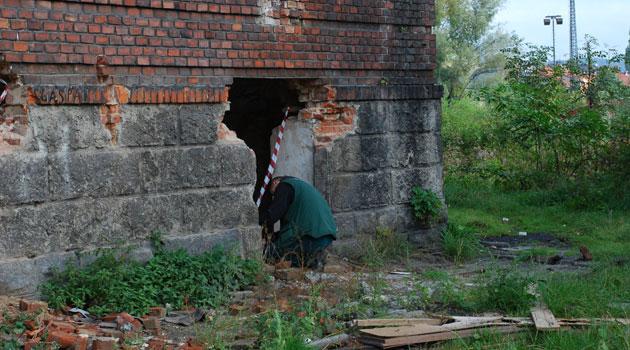Czech Republic: Ostrava ghetto residents want out, but not to residential hotels

They have to heat with wood, they have no electricity, and they continue to draw their potable water from a single shared faucet. This is how the last residents remaining in building number 8 on Přednádraží street in Ostrava now live. Even though the residents have begun slowly repairing the ghetto building with the aid of money from various donors, most told the Czech Press Agency they would like to move out of the locality.
"The current state on Přednádraží is now such that we have been without electricity for two months already. As far as those living in this building, I know that most of them would prefer different housing," resident Imrich Horvát said.
However, Horvát said people do not want to move into residential hotels. "The conditions [in residential hotels] are catastrophic. I would prefer to remain here on Přednádraží, where right now I am not paying any rent, than be in a residential hotel where the rents for just one room are high," Horvát said.
According to Horvát, one sponsor of the locality has already offered financial aid that people could use to pay deposits on new apartments. He believes most people would be interested in such assistance.
"We are doing our best to find an apartment, but those deposits are terrible. We’ve been looking any way we can for a couple of months. We would like to leave, we don’t want to stay here, there’s not much here," a female resident said, adding that while social workers had offered to accommodate her in a residential hotel, she would not be able to take her pets there with her.
Other residents expressed similar views. They believe the problem is that even if people had the money for deposits, they would be rejected once a landlord learns their last residence was on Přednádraží street.
According to the spokesperson for the Municipal Department of Moravská Ostrava a Přívoz, Jana Pondělíčková, a total of 18 residents, including two minors, are still living in the building. "Staff from the Building Works Authority are performing regular inspections of the structural/technical state of the building. Work has been performed on no. 8 but the other buildings remain unchanged," she said, adding that for the time being even no. 8 is not in the kind of shape that might lead to its being permitted for residence.
Kumar Vishwanathan of the Life Together (Vzájemné soužití) civic association, who is assisting the residents, told the Czech Press Agency today that he is trying to take two different routes: One is the effort to help people find new housing, the other is repairing the building. In his view both variants must be worked on because the search for new housing is so problematic.
Vishwanathan says around CZK 300 000 has already been invested into repairs. Work was done, for example, to repair the roof, which has new gutters, to partially introduce a new electricity distributor, and to safeguard the staircase.
"Now all of the effort is focusing on the sewerage. Solid waste is no longer accumulating in the building, that’s all been cleaned out. We have to find a new way forward with the sewer. They used a video camera to explore it and we have an idea of how it might be developed in future," Vishwanathan said.
The problems in the locality on Přednádraží street have existed for many years, but the media only started taking an interest in them last summer. The main cause of the problem was a broken sewer line which no one would take responsibility for.
Except for building no. 8, the other buildings on the street are not fit for habitation and are completely devastated, with broken windows and collapsed ceilings. Originally around 200 tenants lived in them.